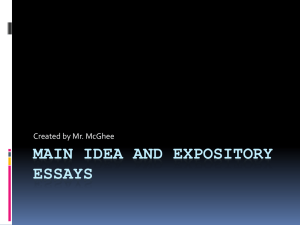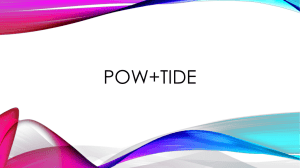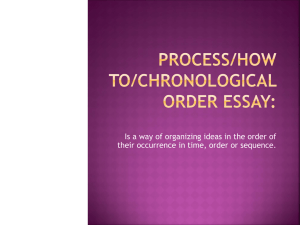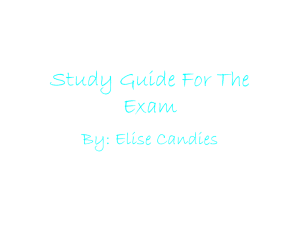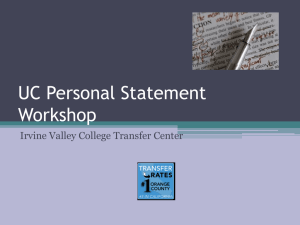The College Essay - Southwest Minnesota State University
advertisement
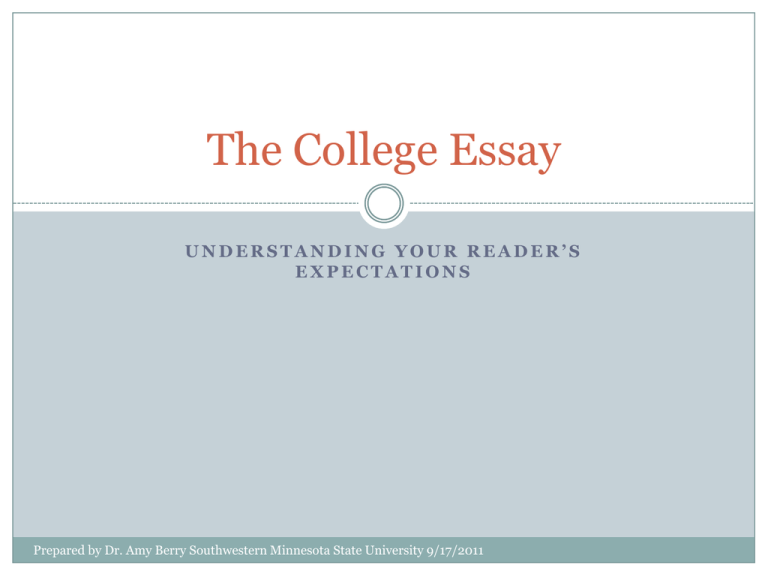
The College Essay UNDERSTANDING YOUR READER’S EXPECTATIONS Prepared by Dr. Amy Berry Southwestern Minnesota State University 9/17/2011 •Understanding your readers’ expectations is the key to writing a successful college essay •Your instructors at the college level will have different expectations from your high school teachers •This lesson will explain the differences in your college readers’ expectations of structure, persuasion as a major purpose for writing, research, and format in your essays Summary The College Essay differs from the High School Essay Structure • High School—Five Paragraph Essay • College—Open, more complex and far more developed structure and content are expected Thesis, Support, Persuasion • High School—Reporting information • College-Thesis driven. Using information to make an argument & persuade the reader to agree with your point of view Depth of the thesis, depth of support, and concrete and detailed supporting facts, information, and expert opinion from collegiate level sources Format and Documentation of Sources • High School-Format determined by your instructor • College—Format determined by subject field. Documentation o Source material required Structure In high school you learned to write five-paragraph essays, book reports, and other short forms of writing. The five paragraph theme is a rigid (or closed) structure. It is designed to limit the topic and to give you the maximum amount of control over the topic The Structure of College Essays In college, the five paragraph theme is too confining and limiting for your purpose of persuading your reader to accept your position on a topic, writing a profile of a unique person, or writing a researched essay. College essay assignments are designed to be open— that is, to give you the space to investigate new ideas and to develop ideas in a deep and extended way. College Essay Structure College Essays are thesis-driven and deeply developed. Readers expect more than the five-paragraph structure. College essays are characterized by a reader frame that orients the reader to the topic, provides essential terms and definitions, and presents the thesis, which is an assertion, often stated as an opinion or position on a topic that has more than two “sides’ and can be debated. The reader Frame also presents an essay roadmap—main points of the essay Multiple body paragraphs develop the assertion using data, expert opinion, logical arguments, and ethical arguments The conclusion of the document adds to the sum of meaning of the essay, often challenging the reader to think differently about the topic. The conclusion also challenges the reader to agree with the thesis, whether it is a thesis statement or is implied College Essays Appeal to the Reader’s Sense of Logic and Ethics College essays are developed using logic and ethical arguments Logical arguments are characterized by the orderly presentation of facts and expert opinion in support of the essay thesis Ethical arguments are assertions that appeal to the reader’s sense of what is right or wrong supported by a foundation of moral and legal theories, ideas, and opinions and that develop the essay thesis. Examples and cases/case briefs provide solid support Using Information to Support Your Thesis In high school, you very often report information. In college, you are expected to use information to analyze and support your position on a debatable topic, and to persuade your reader that your position is correct and acceptable. Your goal is to convince your reader to agree with your point of view. Persuasion (Taking a Position on a Subject and Convincing Your Reader to Agree with That Position) is an Important Purpose for Writing in College In high school, you write essays to learn about something, and then to demonstrate your knowledge by writing a short informative essay explaining the idea or concept. In college, you will be asked to take a position on a topic and to use facts and ideas from source material to support that position. The purpose of your essay is to persuade your reader, usually your professor, to agree with your point of view and your stance on a topic. Research in College Writing In high school, you may have written a research report. You may have used your high school library and a general Internet search to gather information. Then, you wrote a report intended to inform your reader about the topic. In college, research reports are almost always position-based and supported by facts, expert opinions, and logic. You gather information from a variety of credible, reviewed college-level sources you find at the college library or college library webpage access portal. These sources include academic journal articles, books, and data collected into specialized databases, and are intended to persuade your reader to agree with your point of view You are also expected to give credit to the author of your sources Credibility of Source Material Your sources must come from the university library. Your college professors expect that you will use proven and reliable sources to support your thesis and main supporting points and conclusions University sources have been ‘vetted’—reviewed by experts and have been found to be reliable You want to borrow the credibility and power of expert sources to create and maintain your own credibility as a university scholar For example, in doing research on the Big Bang Theory, using source material written by Stephen Hawking, for example, would give you instant credibility. We call this approach to research, “Standing on the Shoulders of Giants” because Hawking is THE expert in this field. He is a ‘giant’ whose vision is vast and wide You also want to use source material that is powerfully written, to borrow the rhetorical strength of the writer. This borrowing of rhetorical power is the only purpose for using direct quotes in a researched position paper or research project paper Multiple Formats used in the College Essay High school essays are often typed according to a style provided by your teacher. College essays, on the other hand, follow guidelines created by academic organizations for specific academic fields of study. You will be asked to format your essays using more than one style. For example, papers on language and literature follow a style created by the Modern Language Association (MLA). Papers in the social sciences and criminal justice follow a style created by the American Psychological Association. Giving Credit to Others for Their Research Documenting sources gives credit to the author of your sources. In-text citations and the Works Cited page gives you credibility as a writer because your readers know that you have used quality source material to create and support your ideas You share your research materials with readers who can find and use your work and that of your sources to create their own essays and research projects You gain your reader’s respect and gain credibility (believability and power) by using articles and books written by the best experts in the field MLA Documentation Resources http://www.dianahacker.com/resdoc/pdf/ Hacker-MLAupdates.pdf Documenting Sources: A Hacker Handbooks Supplement http://www.mla.org/handbook_faq MLA Frequently Asked Questions http://owl.english.purdue.edu/owl/resour ce/557/15/ Purdue University OWL (online writing lab) http://uwp.duke.edu/wstudio/resources/ working_sources.html Duke University Writing Studio


